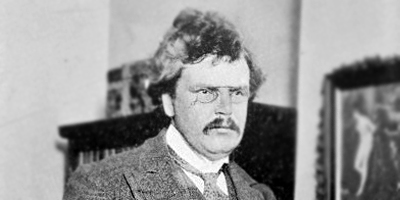
 CHARLESTON—Gilbert Keith Chesterton, 1874-1936, is best known as a prolific British journalist, essayist and novelist who wrote more than 100 books. He also converted to Catholicism, and his writings on Christianity helped C.S. Lewis abandon atheism.
CHARLESTON—Gilbert Keith Chesterton, 1874-1936, is best known as a prolific British journalist, essayist and novelist who wrote more than 100 books. He also converted to Catholicism, and his writings on Christianity helped C.S. Lewis abandon atheism.
A recent revival of interest in Chesterton’s perspective on values, life and faith is leading many people, Catholic and non-Catholic, to search out his work, meet together and discuss its relevance.
Minnesota-based author Dale Ahlquist is at the forefront of the revival in the United States, and hopes to teach people in the Diocese of Charleston about the writer and his message during two talks planned for May 25 and 26 in Charleston.
Ahlquist is the founder of the American Chesterton Society, www.chesterton.org, author of two books on Chesterton, and host of the series “G.K. Chesterton: The Apostle of Common Sense” on the Eternal Word Television Network.
He has also written and lectured extensively; founded the Chesterton Academy, an independent high school in the Twin Cities; and is executive producer of “Manalive,” a film to be released later this year.
Ahlquist was originally an evangelical Protestant and a huge fan of C.S. Lewis. He said he learned that Chesterton was a big influence on Lewis, so he decided to go to the source.
When he first read Chesterton, he felt similar to British novelist Dorothy Sayers, who said the writer was “a strong wind coming into the building and blowing out all the windows.”
“I knew I had encountered a writer like none other,” Ahlquist said. “He was more profound, more complete, and more delightful. He wrote about everything, in all different genres, and did it all frighteningly well. I was astonished by his utter command of the language, but also his command of ideas. Words and ideas are toys to him, but they are also tools in the service of truth.”
Chesterton’s writings, including powerful books on Christianity such as “Orthodoxy” (1908) and “The Everlasting Man” (1927), were the main influences that eventually led Ahlquist to convert to Catholicism.
He started the Chesterton Society because he wanted to expose people to the writer’s work and impact, which had been ignored by mainstream academics and media.
In recent years, Ahlquist said, more young people have become attracted to Chesterton’s work, and devotees have formed local societies around the country.
He fascinates people today because of the scope of his outlook, Ahlquist said, and because he wrote with wit and emotion on everything from literature and politics to philosophy.
The writer argued against the excesses of both capitalism and socialism, and defended the common man, family and beauty.
“I’ve often said that he seems to be writing more about our time than his own time, which was 100 years ago,” Ahlquist said. “He defended the faith, but he also defended the family. He defended life. He also defended liberty. I don’t think people realize how many of our simple liberties have been taken away in the present age. Chesterton saw all of this coming.”
Ahlquist said Chesterton is an effective Catholic apologist because he conveys the excitement and beauty of life founded in the Gospel message.
“Chesterton shows the completeness of the Catholic faith,” he said. “We need Chesterton’s paradoxes to get us to see that obedience is a greater adventure than disobedience, that the life of faith is more exciting than the dullness of doubt, and that truth doesn’t change but fashions and fads change all the time.”
He also offers a profound message about the importance of living a faith-filled life in a secular world.
“As Chesterton says, ‘A dead thing can go with the stream. Only a living thing can go against it,’” Ahlquist said.
Ahlquist will present “Who is ‘The Apostle of Common Sense?’” at 7 p.m. May 25 in the Cathedral of St. John the Baptist parish center. He will talk about Chesterton’s approach to Catholicism in “Why I Am a Catholic” at 7 p.m. May 26 at Pauline Books and Media, 243 King St. For information, call Pauline Sister Clare Stephen at (843) 830-2748.
Chesterton’s major works
The Napoleon of Notting Hill (1 904)
Heretics (1905)
Charles Dickens: A Critical Study (1906)
The Man Who Was Thursday (1908)
Orthodoxy (1908)
The Ballad of the White Horse (1911)
Manalive (1912)
Father Brown short stories (1911-1936)
Eugenics and Other Evils (1922)
St. Francis of Assisi (1923)
The Everlasting Man (1925)
